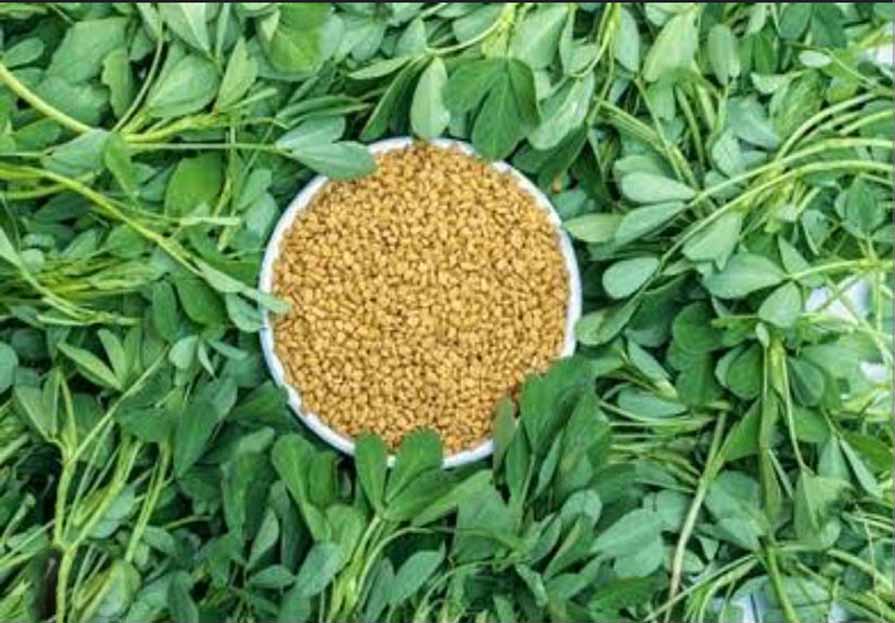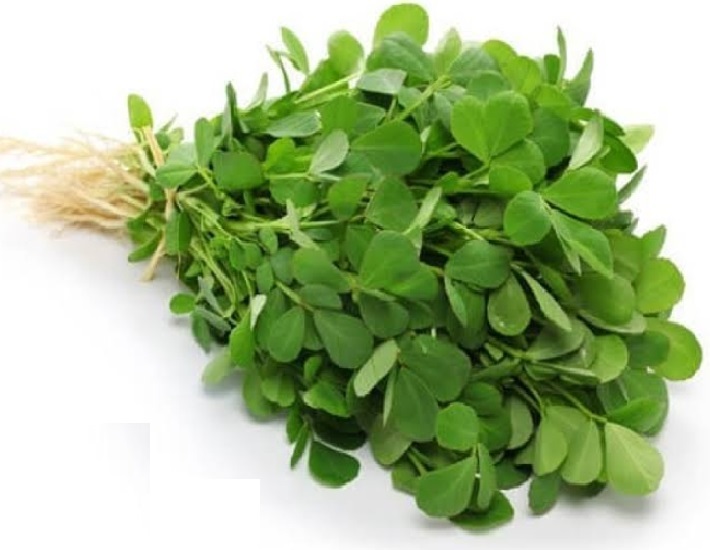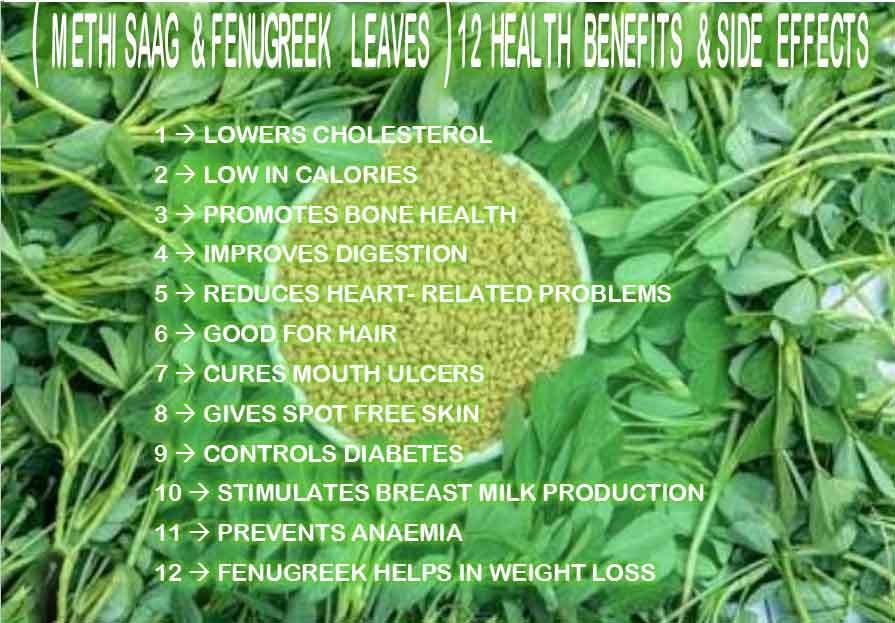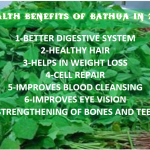What Is Methi Southern Europe and Asia are the natural home of Methi an annual herb with white blooms and hard, angular, yellowish-brown seeds.
METHI & FENUGREEK LEAVES-12 HEALTH BENEFITS & SIDE EFFECTS

- 1 – Lowers cholesterol
- 2 – Low in calories
- 3 – Promotes bone health
- 4 – Improves digestion
- 5 – Reduces heart- related problems
- 6 – Good for hair
- 7 – Cures Mouth Ulcers
- 8 – Gives spot free skin
- 9 – Controls Diabetes
- 10 – Stimulates Breast Milk Production
- 11 – Prevents Anaemia
- 12 – Fenugreek Helps In Weight Loss
What Is Methi & fenugreek?
Southern Europe and Asia are the natural home of Methi, an annual herb with white blooms and hard, angular, yellowish-brown seeds. A herb in the same family as soy is called Methi. The leaves and seeds of methi have a strong flavor and scent. It is grown throughout the Indian subcontinent, North Africa, and the Mediterranean region.
Unknown facts about (fenugreek planT & methi)
- Fenugreek is an annual plant in the family Fabaceae. Its leaves consist of three small obovate to oblong leaflets.
- Methi, or fenugreek, is native to Southeastern Europe, North Africa, the Middle East, and the Indian subcontinent. According to the experts, it is believed to have been cultivated since 4000 BCE.
- This small plant averages less than one meter in height and is one of the few species that utilizes both the seeds and leaves in medicinal and culinary practices.
- The English name Fenugreek is derived from the Middle French fenugreek from Latin faenugraecum, faenum Graecum meaning Greek hay.
- Did you know that fenugreek has a Roman connection? In the 1st century A.D., the Romans used to flavor their wine with fenugreek.
- Almost 80% of India’s total fenugreek production comes from Rajasthan.
- Fenugreek seeds are sometimes used to feed domestic rabbits and fish.
- The iconic maple syrup smell of fenugreek leaves and seeds comes from a chemical called Sotolon. That’s why fenugreek is also used as a flavor in imitation maple syrup or tea.
- Fenugreek is often used as a cover crop to improve the nitrogen content of the soil that promotes good quality of other plants.
STRONG ANTIOXIDANT

Being enriched with antioxidants like Beta Carotene and Vitamin C, it helps to build body’s immune system to fight against common illnesses. 1 cup Methi gives 36.4% of RDA (Recommended Daily Allowance) for Vitamin C and 13.65% of RDA for Vitamin A. Care should be taken while cooking as Vitamin C is easily destroyed with heat. Avoid overcooking of Vitamin C rich vegetables. Choose from our wide range of antioxidants rich recipes like carrot Methi leaves and Cauliflower Greens, Methi and spinach Healthy vagirabil that are rich in both Beta Carotene and Vitamin-C
NUTRIENT VALUE IN 100 GRAMS OF METHI SAAG & FENUGREEK LEAVES
Methi, or fenugreek, is commonly used in Indian cuisine, both directly as a vegetable and also as a flavoring agent. These leaves are endowed with various essential minerals and vitamins. The nutritional value of 100 grams of fenugreek leaves, or methi Saag, is listed below: –
| Nutrient | Value In 100 G |
| Vitamin A | 1% |
| Calories | 323mg |
| Fat | 6g |
| Carbohydrate | 58g |
| Fiber | 1.1g |
| Sodium | 67mg |
| Potassium | 770mg |
| Protein | 23g |
| Vitamin C | 5% |
| Vitamin B6 | 30% |
| Phosphorus | 51mg |
| Iron | 186% |
| Copper | 0.26mg |
| Magnesium | 47% |
| Vitamin B2 | 0.2mg |
| Calcium | 0.17% |
NUTRITIONAL CONTENTS OF METHI
The use of methi leaves in treating arthritis is well-known worldwide. This is because the intestines are cleaned, and the body’s waste is flushed out when fenugreek leaves are consumed twice daily. In addition, leaves and seeds are very high in protein and a great source of dietary fiber. Some essential vitamins and nutrients in methi leaves are folic acid, thiamin, vitamins A, b2, B6, and C, riboflavin, and niacin. Among other components, fenugreek leaves contain a sizable quantity of calcium, iron, phosphorus, and potassium. Vitamin K is also present in methi leaves.
It is quite evident from the table mentioned above that methi leaves are rich sources of nutrients that will only benefit your body and mind. The major health benefits of fenugreek leaves are explained below:
1 – LOWERS CHOLESTEROL
Diseases like atherosclerosis are brought on by high cholesterol levels. It happens as a result of fat deposits accumulating in the arteries and restricting blood flow. As a result, it causes heart failure, excessive blood pressure, and stroke. Accord.ng to studies, eating fenugreek leaves may help lower cholesterol. They accomplish this by limiting the body’s production of harmful cholesterol, and thus atherosclerosis is avoided.
2 – LOW IN CALORIES
Fenugreek is low in calories, which means it can be helpful for people with obesity. Obesity can be one of the prime reasons behind rising health problems like diabetes, high blood sugar, and heart-related problems. Methi is low in calories and high in fiber, and that will keep one full for a longer time, which will stop overeating or control food cravings. Including methi in your diet will keep you fit.
One cup of methi leaves gives only 13 calories making it a good choice for those controlling their calorie intake. It will not only add bulk to your diet but also will make you feel fuller. You will feel satiated for a longer period and refrain from eating extra calories. You can try making our Low calorie fenugreek leaves recipes like Methi Oats Roti and Sprouted Moong and Methi Chila if you want to lose those extra kilos
3 – PROMOTES BONE HEALTH
The nutrients calcium, magnesium, and vitamin D are abundant in fenugreek. They are vital to the health of the bones. They help build up bones and promote bone repair. Fenugreek contains a substance called diosgenin. According to research, it limits the production of osteoclasts.
Osteoclasts are cells that degrade bone to initiate normal bone remodeling and mediate bone loss in pathologic conditions by increasing their resorptive activity. They are more noticeable when you have osteoporosis, a condition that makes your bones brittle and prone to breaking. So, fenugreek can be helpful in conditions like osteoporosis and fractures.

Bone Health Rich in Vitamin K which is good for bone metabolism. Bone metabolism is a continuous process where mature bone tissue is removed from the skeleton and replaced by new tissue. When injuries occur to the bone like fractures or bruises, then Vitamin K kicks in to heal the injury. Vitamin K prevents loss of bone density and preventing the onset of Osteoporosis.
One cup chopped fenugreek gives 110 mg of Calcium which is 18.4% of RDA (Recommended Daily Allowance). Calcium is a mineral that makes bones stay strong. The human body consistently removes small amounts of calcium from our bones and that has to be topped up with Calcium rich recipes like Methi and Moong Sprouts Wrap and Bajra methi paneer paratha.
4 – IMPROVES DIGESTION
Fenugreek leaves are very effective in treating dyspepsia and liver dysfunction. Additionally, it aids in reducing digestive disorders and numerous intestinal diseases. Fenugreek leaves are frequently used to treat digestive issues like gastritis, constipation, and an upset stomach, among others.

Good for Digestive System The insoluble fiber present in methi leaves reduces the risk of constipation and promote regular and healthy bowel movements. Methi is regarded highly beneficial in the treatment of flatulence and indigestion. (Baingan recipe – brinjal methi sabzi) and oats methi muthia is a good option for lunch if you are suffering from constipation.
5 – REDUCES HEART- RELATED PROBLEMS
Fenugreek leaves help reduce the chances of unanticipated blood clotting in the heart. The presence of antioxidants in fenugreek leaves makes it a perfect food for a healthy heart. Also, the presence of dietary fiber in methi Saag is helpful in regulating cholesterol levels, which in turn reduces the risks of any heart disease.
6 – GOOD FOR HAIR
Who wouldn’t want thick and lustrous hair? Methi or fenugreek seeds can help you bid adieu to your major hair problems, like thinning or dandruff. To promote hair growth, boiling methi seeds with coconut oil is an age old home remedy passed down by our grandmothers. A paste made with soaked fenugreek seeds and curd can remove dandruff. A paste of fenugreek leaves or seeds can help you achieve shinier strands.
7 – CURES MOUTH ULCERS
Fenugreek leaves can cure mouth ulcers. All you need to do is boil a cup of fenugreek leaves with 2 cups of water. Strain and use the water to gargle.
8 – GIVES SPOT FREE SKIN
With time, there are various problems that your skin might face, like a tan or wrinkles. Methi leaves and seeds can help you remove all those skin problems. It helps you get your original skin complexion back. Fenugreek leaves are believed to provide spot-free skin.
A face pack with methi leaves and turmeric powder can remove blackheads and pimples. Apart from these aforementioned health benefits, fenugreek leaves also help in preventing gastric disorders, fighting diabetes, protecting the liver, improving kidney functions, improving male fertility, and promoting lactation among breastfeeding women.

It also has antimicrobial properties that can help heal the wound. Fenugreek leaves are great for overall health and are easy to plant and harvest. As it is a low- maintenance plant, ‘this perfect even for beginners. All you need to do is take care of the minimal requirements. You can plant this herb and reap its benefits this season, and this blog will assist you in doing so.
9 – CONTROLS DIABETES
Fenugreek prevents rise in glucose levels after meals. Fenugreek leaves help in improving glucose and insulin responses. The levels of cholesterol also reduced with intakes of fenugreek leaves. Try making Methi recipe which are a great to have as snacks because they are low in calories and also give only 12.7 grams of carbs per serving.
10 – STIMULATES BREAST MILK PRODUCTION
According to Ayurveda, methi is rich in diosgenin stimulates production of milk in lactating mothers, and helps induce childbirth. Both the seeds and leaves work as excellent galactagogues to stimulate breast milk production. Fenugreek herbal tea is found to be effective in enhancing breast milk production.
11 – PREVENTS ANAEMIA
Fenugreek leaves contain Folate, which is important for rapid growth and multiplication of RBC’s and WBC’s in the bone marrow. 1 cup of chopped fenugreek leaves give 21.07 mcg of folate which is 10.57% of Recommended Daily Allowance (RDA). It is good to have before and during pregnancy as the requirements increase.
1 cup of Chopped Fenugreek leaves give 7.57% of RDA for Iron. A very good food for blood formation for adolescent girls to pregnant mothers. Iron is an important component of hemoglobin, the substance in red blood cells that carries oxygen from your lungs to all parts of the body. So if you’re iron deficient then you must consume fenugreek recipes like Methi Muthia and Cauliflower Greens Methi and spinach Healthy vegetable dish.
12 – FENUGREEK HELPS IN WEIGHT LOSS
Fenugreek is many times used to complement diet and exercise to aid weight loss. Fenugreek aids weight loss due to its abilities to suppress appetite, provide energy in the short term and potentially modulate carbohydrate metabolism. Fenugreek water made from soaked fenugreek seeds is many times used to aid in losing weight.
FENUGREEK LEAVES, ALSO KNOWN AS METHI LEAVES, CAN HAVE SIDE EFFECTS, INCLUDING:
- Digestive issues: Diarrhea, nausea, bloating, gas, or stomach upset.
- Allergic reactions: Skin rashes or itching, especially for people with asthma.
- Slowed blood clotting: Increasing the risk of bruising and bleeding.
- Uterine contractions: Pregnant women should use fenugreek cautiously or consult with a healthcare provider before consuming large amounts.
Fenugreek is generally safe in the amounts commonly found in foods, but its safety in larger doses is uncertain. Children should not use fenugreek as a supplement. Fenugreek may also interact with other medications including:
- Diabetes medications.
- Medications that slow blood clotting.
- Warfarin (Coumadin).
- Metoprolol (Toprol).
- Phenytoin (Dilantin).
Sildenafil (Viagra) Side Effects of Fenugreek Leaves A few people may experience allergic reactions, including skin rashes or itching. Pregnant women should consult with a healthcare provider before consuming large amounts of fenugreek leaves, as they may ha
IF YOU WANT TO KNOW MORE ABOUT THESE HEALTH BENEFITS AND THE BENEFITS OF VEGETABLES, CLICK ON THIS LINK











